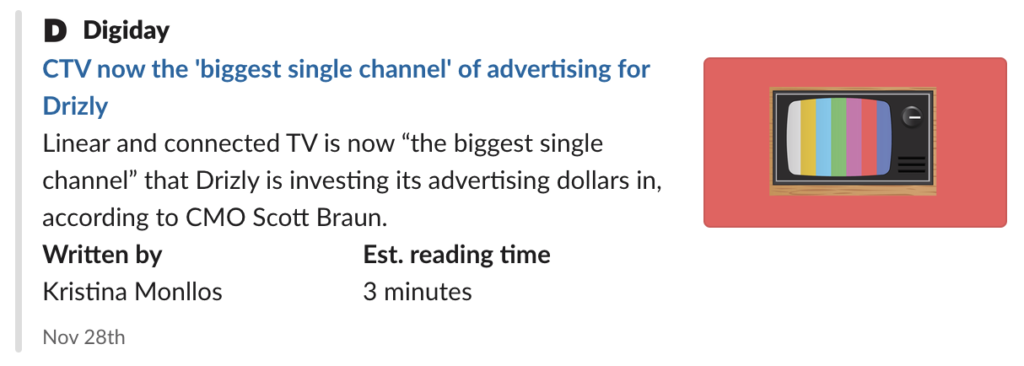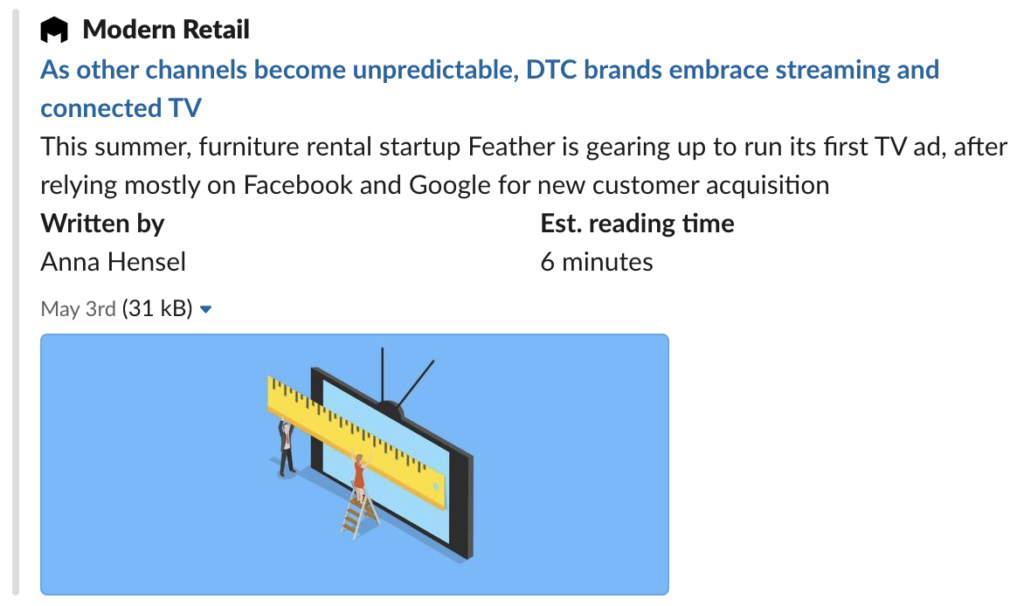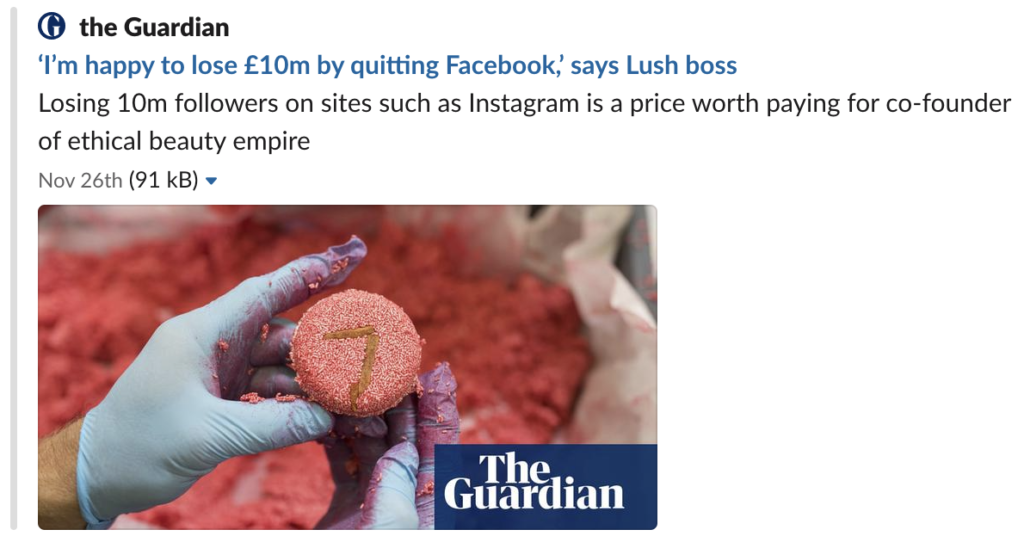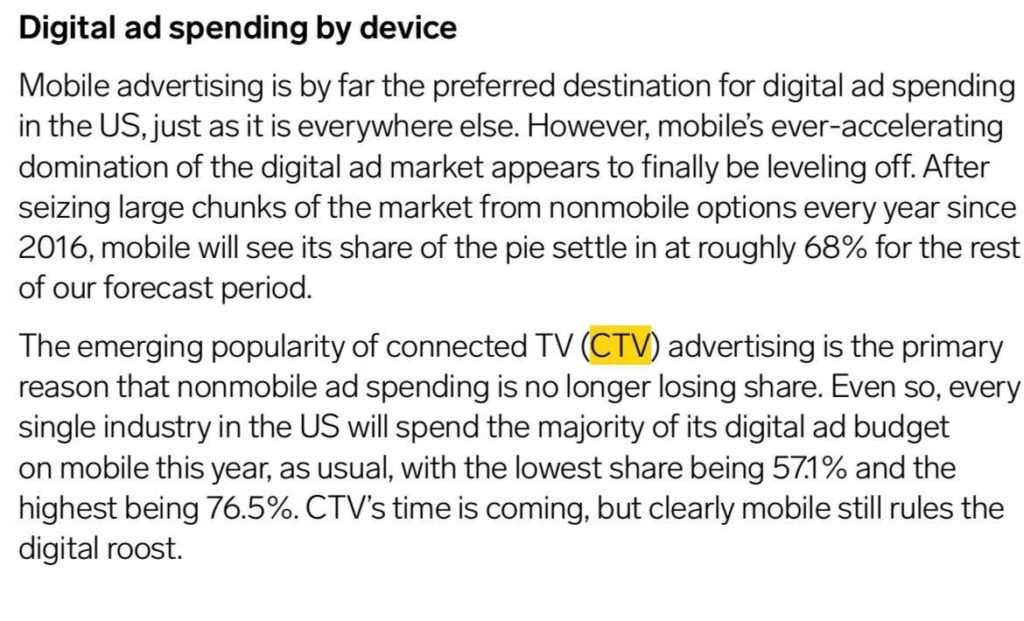From the MNTN Slack: What Netflix’s Q1 Report Signals About the Future of Streaming
by Cat Hausler
8 Min Read
CES 2024: Stagwell (STGW) and MNTN Announce Partnership in Unified Performance SolutionsLearn More

6 Min Read
Alcohol brand Drizly recently announced that Connected TV advertising will be their single biggest digital channel, with many brands to follow suit. We’ve noticed a trend of brands taking away budget from social media to fuel their CTV campaign efforts – but is it only Connected TV’s performance marketing bonafides which is causing this transition, or is it part of a larger conversation about social media and its negative impact on consumer’s mental health and wellbeing? Our team discussed this latest news update in the MNTN Slack news room:
Mel.Yap (Senior Content Marketing Manager) – @channel Hey team! Here’s a great example of a brand that’s already shifting the majority of their budget to CTV – a sign of CTV taking up a larger slice of the pie? I wonder if they’re one of the 55% of advertisers surveyed in our recent Digiday State of TV Advertising in the Connected Age report who cited moving their budget to Connected TV over the last 1-3 years. Thoughts?

Hooman.Javidan.Nejad (Director, Performance Marketing) – What a great article! Drizly isn’t alone in increasing its investment in CTV in recent years. Many brands have made returns to TV advertising after reconsidering the value of being on TV. DTC brands have been moving beyond the old DTC playbook of Facebook and Instagram to TV, using the channel to add legitimacy to their brands. Feather, the furniture rental company, ThirdLove and Casper are other direct-to-consumer examples that made CTV a bigger part of their advertising strategy.
This article covers some stories about how performance marketers are making a case to move ad dollars from Google and Facebook to CTV advertising.

Tim.Edmundson (Director, Content Marketing) – These are both great reads! And yeah, you have to wonder how much budget will eventually make its way to Connected TV. Especially with paid social bogged down with privacy concerns regarding mobile app tracking, it is hindering brands ability to achieve the same results on that channel.
But CTV isn’t being hit with those issues, and offers solid audience targeting and measurement. It would make sense to see more advertisers start to shift budget from social and into CTV. Our survey with Digiday just found that 41% of marketers shifted budget from social to CTV, so it’s already happening…
Stephen.Graveman (Content Marketing Manager) – Between privacy concerns, whistleblower accusations, and just general exhaustion from doom scrolling, it seems like it’s not just brands re-evaluating their relationship with social media – a lot of consumers are, too. With the exception of YouTube and Reddit, most social media platforms showed little growth in over two years.
I think the current cultural conversation about social media is only going to drive increased focus on CTV advertising – especially if consumers start using social media less but continue cutting the cord at their current rate. Brands need to be where their consumers are. And if the target audience happens to to be flocking to a platform that offers all of the targeting and metrics that digital marketing offers, with the ability to tell compelling visual stories – I mean, that’s a great outcome for advertisers. I think this social-to-CTV upgrade path is just getting started.

Mel.Yap – @Hooman, I remember you shared this article below with us on our call yesterday. It makes me wonder if brands like Drizly aren’t just moving their dollars over to Connected TV for help drive performance. It could be a case of ethics and social good as well? As @Stephen mentioned, Facebook/Meta isn’t exactly making headlines in the press for the right reasons as we’ve seen over the past few months.

Hooman.Javidan.Nejad – That article caught my eyes cause it is a big deal! It is a big deal for a consumer brand with 10 million followers on Instagram to go off of that channel right before Thanksgiving. It is a big deal that Lush CEO acknowledged there will be at least £10m loss as the result of this move, but they still decided to quit social media. Lush shut their social accounts on Facebook, Instagram, Snapchat and TikTok accounts on Friday, the biggest shopping day of the year. They are making teenagers mental health a priority and these are the type of DTC brands who will win the heart of consumers. Not necessarily the ones with the biggest ad dollars.
Rafael.Bracero (Director, Product Marketing) – Hi all, does this article say the beauty brand moved media dollars to CTV? I have a good find…it’s the zenith of mobile as more brands look to move media inventory to CTV for better engagement.

Mel.Yap – @Rafa nice find! Also to your question earlier, no – the article doesn’t address where Lush (the beauty brand) moved their dollars, but it’s interesting to see how many companies are taking a stance against the traditional social media route. In this brand’s case, it’s not all about the profits (they lost millions of dollars by switching off their social accounts) but staying true to their values as a brand. We’re even seeing a ‘changing of the guard’ in big tech – Twitter’s CEO Jack Dorsey just stepped down yesterday “The founders of today’s biggest tech giants are growing tired of managing their empires, which are increasingly burdened by political controversy and hard-to-fix problems like misinformation and hate speech. They don’t see an easy way out, and they’re more excited by building new things than fixing old ones. So they are turning those empires over to others and heading off in search of new frontiers.” (from this NY Times article published today)

Subscribe to the report Apple, Amazon, NBC and more use to get their CTV news.